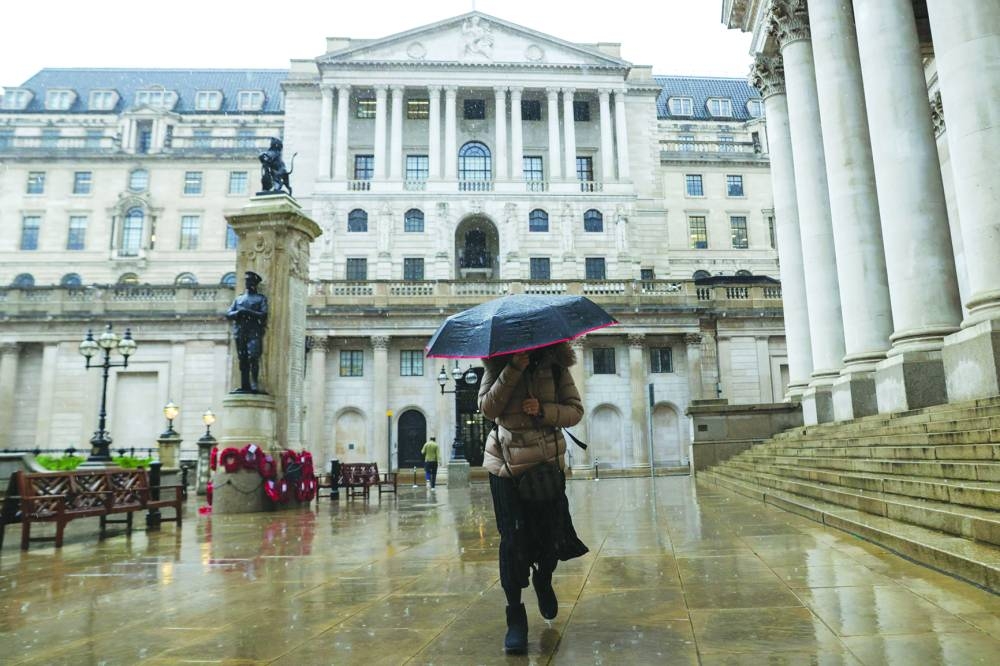An interest rate cut from the Bank of England (BoE) next week looks unlikely but investors will be watching its September meeting for clues about future moves, as well as a decision over the pace of its bond sales — a hot political topic.
All 65 economists in a Reuters poll said the BoE will likely hold rates at 5.0% on September 19, after cutting from a 16-year high of 5.25% in August.
News on price pressures has been mixed. Wage growth cooled as members of the Monetary Policy Committee expected last month and the economy failed to grow in July.
But the Decision Maker Panel — a business survey favoured by the MPC — showed wage growth expectations stopped falling, and data on Wednesday will likely show inflation above the central bank’s 2% target.
Markets on Thursday priced in a roughly one-in-five chance of an interest rate cut next week, with a 0.25 percentage point reduction fully priced for November.
With British wage growth and services inflation riding high, investors think the BoE will loosen policy by less than the US Federal Reserve over the next year and similarly to the European Central Bank — although the ECB has already cut rates twice this year, including a day ago.
Economists at Nomura said the BoE’s close 5-4 vote in August and healthy business surveys pointed to a hold next Thursday.
“We see the MPC skipping this month’s meeting and cutting interest rates again only in November,” they said, adding that the MPC’s Swati Dhingra was likely to be the sole voice for a cut this time.
Bond investors are hotly anticipating Thursday’s annual decision on the pace of the BoE’s quantitative tightening (QT) programme — the reversal of hundreds of billions of pounds of British government bond purchases from past attempts to stimulate the economy.
Last year the MPC voted to run down its stock of gilts by 100bn pounds ($131bn) through a combination of active sales and allowing bonds to mature.
Lawmakers have criticised the QT programme because it brings forward losses sustained by the BoE, which purchased gilts in past years at much higher prices than their current sale value. Those losses are paid for by already-stretched taxpayers.
Nonetheless, the BoE could on Thursday announce an acceleration of its QT programme, reflecting the fact that it holds 87bn pounds of gilts that are due to mature naturally over the next year, leaving little room for active gilt sales at the current pace.
“The vote on the pace of QT could be the more important one,” Andrew Goodwin, chief UK economist at Oxford Economics consultancy, said. BoE Governor Andrew Bailey has said QT is needed to restore the central bank’s firepower if it has to stimulate the economy with bond purchases again. Goodwin and most other forecasters think the BoE is likely to keep QT running at 100bn pounds per year, but he said an increase to 115-120bn pounds was a plausible scenario.
Given its impact on the state’s budget, finance minister Rachel Reeves will take a keen interest in Thursday’s QT decision. Last week she said QT was an operational matter for the BoE when pressed by lawmakers about the scale of taxpayer losses.
Reeves will likely change Britain’s fiscal rules to exclude the impact of the BoE’s QT programme in her inaugural budget, due on October 30, Goodwin said. “This change would increase her fiscal headroom considerably,” he said.

A pedestrian walks past the Bank of England in the city of London. An interest rate cut from the BoE next week looks unlikely but investors will be watching its September meeting for clues about future moves, as well as
a decision over the pace of its bond sales — a hot political topic.
